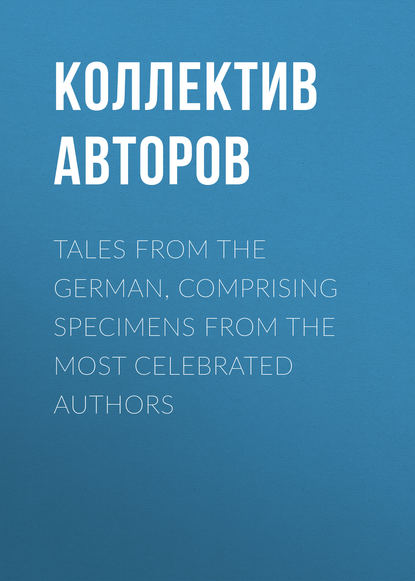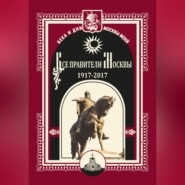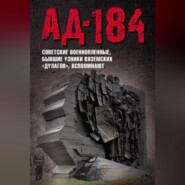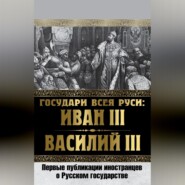По всем вопросам обращайтесь на: info@litportal.ru
(©) 2003-2024.
✖
Tales from the German, Comprising specimens from the most celebrated authors
Настройки чтения
Размер шрифта
Высота строк
Поля
Nathaniel was about to fly out in a passion, but he quickly recollected himself, and retorted: "Tell me, Sigismund, how it is that Olympia's heavenly charms could escape your glance, which generally perceives every thing so clearly – your active senses? But, for that very reason, Heaven be thanked, I have not you for my rival; otherwise, one of us must have fallen a bleeding corpse!"
Sigismund plainly perceived his friend's condition, so he skilfully gave the conversation a turn, and added, after observing that in love-affairs there was no disputing about the object: "Nevertheless it is strange, that many of us think much the same about Olympia. To us – pray do not take it ill, brother, – she appears singularly stiff and soulless. Her shape is symmetrical – so is her face – that is true! She might pass for beautiful, if her glance were not so utterly without a ray of life – without the power of seeing. Her pace is strangely measured, every movement seems to depend on some wound-up clockwork. Her playing – her singing has the unpleasantly correct and spiritless measure of a singing machine, and the same may be said of her dancing. To us, this Olympia has been quite unpleasant; we wished to have nothing to do with her; it seems as if she acts like a living being, and yet has some strange peculiarity of her own." Nathaniel did not completely yield to the bitter feeling, which was coming over him at these words of Sigismund; he mastered his indignation, and merely said, with great earnestness, "Well may Olympia appear awful to you, cold prosaic man. Only to the poetical mind does the similarly organised develop itself. To me alone was her glance of love revealed, beaming through mind and thought; only in the love of Olympia do I find myself again. It may not suit you, that she does not indulge in idle chit-chat like other shallow minds. She utters few words, it is true, but these few words appear as genuine hieroglyphics of the inner world, full of love and deep knowledge of the spiritual life in contemplation of the eternal yonder. But you have no sense for all this, and my words are wasted on you." "God preserve you, brother," said Sigismund very mildly, almost sorrowfully; "but it seems to me, that you are in an evil way. You may depend upon me, if all – no, no, I will not say any thing further." All of a sudden it seemed to Nathaniel as if the cold prosaic Sigismund meant very well towards him, and, therefore, he shook the proffered hand very heartily.
Nathaniel had totally forgotten, that there was in the world a Clara, whom he had once loved; – his mother – Lothaire – all had vanished from his memory; he lived only for Olympia, with whom he sat for hours every day, uttering strange fantastical stuff about his love, about the sympathy that glowed to life, about the affinity of souls, to all of which Olympia listened with great devotion. From the very bottom of his desk, he drew out all that he had ever written. Poems, fantasies, visions, romances, tales – this stock was daily increased with all sorts of extravagant sonnets, stanzas, and canzone, and he read all to Olympia for hours in succession without fatigue. Never had he known such an admirable listener. She neither embroidered nor knitted, she never looked out of window, she fed no favourite bird, she played neither with lap-dog nor pet cat, she did not twist a slip of paper nor any thing else in her hand, she was not obliged to suppress a yawn by a gentle forced cough. In short, she sat for hours, looking straight into her lover's eyes, without stirring, and her glance became more and more lively and animated. Only when Nathaniel rose at last, and kissed her hand and also her lips, she said "Ah, ah!" adding "good night, dearest!" "Oh deep, noble mind!" cried Nathaniel in his own room, "by thee, by thee, dear one, am I fully comprehended." He trembled with inward transport, when he considered the wonderful accordance that was revealed more and more every day in his own mind, and that of Olympia, for it seemed to him as if Olympia had spoken concerning him and his poetical talent out of the depths of his own mind; – as if the voice had actually sounded from within himself. That must indeed have been the case, for Olympia never uttered any words whatever beyond those which have been already mentioned. Even when Nathaniel, in clear and sober moments, as for instance, when he had just woke in the morning, remembered Olympia's utter passivity, and her paucity and scarcity of words, he said: "Words, words! The glance of her heavenly eye speaks more than any language here below. Can a child of heaven adapt herself to the narrow circle which a miserable earthly necessity has drawn?" Professor Spalanzani appeared highly delighted at the intimacy of his daughter with Nathaniel. To the latter he gave the most unequivocal signs of approbation, and when Nathaniel ventured at last to hint at an union with Olympia, he smiled with his white face, and thought "he would leave his daughter a free choice in the matter." Encouraged by these words, and with burning passion in his heart, Nathaniel resolved to implore Olympia on the very next day, that she would say directly, in plain words, that which her kind glance had told him long ago; namely, that she loved him. He sought the ring which his mother had given him at parting, that he might give it to Olympia as a symbol of his devotion, of his life which budded forth and bloomed with her alone. Clara's letters and Lothaire's came into his hands during the search; but he flung them aside indifferently, found the ring, put it up and hastened over to Olympia. Already on the steps, in the hall he heard a strange noise, which seemed to proceed from Spalanzani's room. There was a stamping, a clattering, a pushing, a hurling against the door, intermingled with curses and imprecations. "Let go, let go, rascal! – scoundrel! Body and soul ventured in it? Ha, ha, ha! that I never will consent to – I, I made the eyes, I the clockwork – stupid blockhead with your clockwork – accursed dog of a bungling watch-maker – off with you – Satan – stop, pipe-maker – infernal beast – hold – begone – let go!" These words were uttered by the voices of Spalanzani, and the hideous Coppelius, who was thus raging and clamoring. Nathaniel rushed in, overcome by the most inexpressible anguish. The professor held a female figure fast by the shoulders, the Italian Coppola grasped it by the feet, and thus they were tugging and pulling, this way and that, contending for the possession of it, with the utmost fury. Nathaniel started back with horror, when in the figure he recognised Olympia. Boiling with the wildest indignation, he was about to rescue his beloved from these infuriated men, but at that moment, Coppola, turning himself with the force of a giant, wrenched the figure from the professor's hand, and then with the figure itself gave him a tremendous blow, which made him reel and fall backwards over the table, where vials, retorts, bottles, and glass cylinders were standing. All these were dashed to a thousand shivers. Now Coppola flung the figure across his shoulders, and, with frightful, yelling laughter, dashed down the stairs, so that the feet of the figure, which dangled in the ugliest manner, rattled with a wooden sound on every step. Nathaniel stood paralysed; he had seen but too plainly that Olympia's waxen, deadly pale countenance had no eyes, but black holes instead – she was, indeed, a lifeless doll. Spalanzani was writhing on the floor; the pieces of glass had cut his head, heart, and arms, and the blood was spirting up, as from so many fountains. But he soon collected all his strength. "After him – after him – why do you pause? Coppelius, Coppelius, has robbed me of my best automaton – a work of twenty years – body and soul set upon it – the clock-work – the speech – the walk, mine; the eyes stolen from you. The infernal rascal – after him; fetch Olympia – there you have the eyes!"
And now Nathaniel saw how a pair of eyes, which lay upon the ground, were staring at him; these Spalanzani caught up, with the unwounded hand, and flung against his heart. At this, madness seized him with its burning claws, and clutched into his soul, tearing to pieces all his thoughts and senses. "Ho – ho – ho – a circle of fire! of fire! – turn thyself round, circle! merrily, merrily, ho, thou wooden doll – turn thyself, pretty doll!" With these words he flew at the professor and pressed in his throat. He would have strangled him, had not the noise attracted many people, who rushed in, forced open Nathaniel's grasp, and thus saved the professor, whose wounds were bound immediately. Sigismund, strong as he was, was not able to master the mad Nathaniel, who with frightful voice kept crying out: "Turn thyself, wooden doll!" and struck around him with clenched fists. At last the combined force of many succeeded in overcoming him, in flinging him to the ground, and binding him. His words were merged into a hideous roar, like that of a brute, and raging in this insane condition he was taken to the mad-house.
Before, gentle reader, I proceed to tell thee what more befel the unfortunate Nathaniel, I can tell thee, in case thou takest an interest in the skilful optician and automaton-maker, Spalanzani, that he was completely healed of his wounds. He was, however, obliged to leave the university, because Nathaniel's story had created a sensation, and it was universally deemed an unpardonable imposition to smuggle wooden dolls instead of living persons into respectable tea-parties – for such Olympia had visited with success. The lawyers called it a most subtle deception, and the more culpable, inasmuch as he had planned it so artfully against the public, that not a single soul – a few cunning students excepted – had detected it, although all now wished to play the acute, and referred to various facts, which appeared to them suspicious. Nothing very clever was revealed in this way. For instance, could it strike any one as so very suspicious, that Olympia, according to the expression of an elegant tea-ite, had, contrary to all usage, sneezed oftener than she had yawned? "The former," remarked this elegant person, "was the self-winding-up of the concealed clockwork, which had, moreover, creaked audibly" – and so on. The professor of poetry and eloquence took a pinch of snuff, clapped first the lid of his box, cleared his throat, and said, solemnly, "Ladies and gentlemen, do you not perceive how the whole affair lies? It is all an allegory – a continued metaphor – you understand me —Sapienti sat." But many were not satisfied with this; the story of the automaton had struck deep root into their souls, and, in fact, an abominable mistrust against human figures in general, began to creep in. Many lovers, to be quite convinced that they were not enamoured of wooden dolls, would request their mistress to sing and dance a little out of time, to embroider and knit, and play with their lap-dogs, while listening to reading, &c.; and, above all, not to listen merely, but also sometimes to talk, in such a manner as presupposed actual thought and feeling. With many did the bond of love become firmer, and more chaining, while others, on the contrary, slipped gently out of the noose. "One cannot really answer for this," said some. At tea-parties, yawning prevailed to an incredible extent, and there was no sneezing at all, that all suspicion might be avoided. Spalanzani, as already stated, was obliged to decamp, to escape the criminal prosecution for fraudulently introducing an automaton into human society. Coppola had vanished also.
Nathaniel awakened as from a heavy, frightful dream; he opened his eyes, and felt an indescribable sensation of pleasure streaming through him, with soft heavenly warmth. He was in bed in his own room, in his father's house, Clara was stooping over him, and Lothaire and his mother were standing near. "At last, at last, oh beloved Nathaniel, hast thou recovered from thy serious illness – now thou art again mine!" So spoke Clara, from the very depth of her soul, and clasped Nathaniel in her arms. But with mingled sorrow and delight did the brightly glowing tears fall from his eyes, and he deeply groaned forth: "My own – my own Clara!" Sigismund, who had faithfully remained with his friend in the hour of trouble, now entered. Nathaniel stretched out his hand to him. "And thou, faithful brother, hast not deserted me?" Every trace of Nathaniel's madness had vanished, and he soon gained strength amid the care of his mother, his beloved, and his friends. Good fortune also had visited the house, for an old penurious uncle, of whom nothing had been expected, had died, and had left the mother, besides considerable property, an estate in a pleasant spot near the town. Thither Nathaniel, with his Clara, whom he now thought of marrying, his mother, and Lothaire, desired to go. Nathaniel had now grown milder and more docile than he had ever been, and he now understood, for the first time, the heavenly purity and the greatness of Clara's mind. No one, by the slightest hint, reminded him of the past. Only, when Sigismund took leave of him, Nathaniel said: "Heavens, brother, I was in an evil way, but a good angel led me betimes to the path of light! Ah, that was Clara!" Sigismund did not let him carry the discourse further for fear that deeply wounding recollections might burst forth bright and flaming. It was about this time that the four happy persons thought of going to the estate. They were crossing, at noon, the streets of the city, where they had made several purchases, and the high steeple of the town-house already cast its gigantic shadow over the market-place. "Oh," said Clara, "let us ascend it once more, and look at the distant mountains!" No sooner said than done. Nathaniel and Clara both ascended the steps, the mother returned home with the servant, and Lothaire, not inclined to clamber up so many steps, chose to remain below. The two lovers stood arm in arm in the highest gallery of the tower, and looked down upon the misty forests, behind which the blue mountains were rising like a gigantic city.
"Look there at that curious little gray bush, which actually seems as if it were striding towards us," said Clara. Nathaniel mechanically put his hand into his breast pocket – he found Coppola's telescope, and he looked on one side. Clara was before the glass. There was a convulsive movement in his pulse and veins, – pale as death, he stared at Clara, but soon streams of fire flashed and glared from his rolling eyes, and he roared frightfully, like a hunted beast. Then he sprang high into the air, and, in the intervals of a horrible laughter, shrieked out, in a piercing tone, "Wooden doll – turn thyself!" Seizing Clara with immense force he wished to hurl her down, but with the energy of a desperate death-struggle she clutched the railings. Lothaire heard the raging of the madman – he heard Clara's shriek of agony – fearful forebodings darted through his mind, he ran up, the door of the second flight was fastened, and the shrieks of Clara became louder and louder. Frantic with rage and anxiety, he dashed against the door, which, at last, burst open. Clara's voice became fainter and fainter. "Help – help – save me!" – with these words the voice seemed to die in the air. "She is gone – murdered by the madman!" cried Lothaire. The door of the gallery was also closed, but despair gave him a giant's strength, and he burst it from the hinges. Heavens – Clara, grasped by the mad Nathaniel, was hanging in the air over the gallery, – only with one hand she still held one of the iron railings. Quick as lightning Lothaire caught his sister, drew her in, and, at the same moment, struck the madman in the face with his clenched fist, so that he reeled and let go his prey.
Lothaire ran down with his fainting sister in his arms. She was saved. Nathaniel went raging about the gallery and bounded high in the air, crying, "Fire circle turn thyself – turn thyself!" The people collected at the sound of the wild shriek, and among them, prominent by his gigantic stature, was the advocate Coppelius, who had just come to the town, and was proceeding straight to the market-place. Some wished to ascend and secure the madman, but Coppelius laughed, saying, "Ha, ha, – only wait – he will soon come down of his own accord," and looked up like the rest. Nathaniel suddenly stood still as if petrified; he stooped down, perceived Coppelius, and yelling out, "Ah, pretty eyes – pretty eyes!" – he sprang over the railing.
When Nathaniel lay on the stone pavement, with his head shattered, Coppelius had disappeared in the crowd.
Many years afterwards it is said that Clara was seen in a remote spot, sitting hand in hand with a kind-looking man before the door of a country house, while two lively boys played before her. From this it may be inferred that she at last found that quiet domestic happiness which suited her serene and cheerful mind, and which the morbid Nathaniel would never have given her.
J. O.
MICHAEL KOHLHAAS,[18 - On one point the translator of this tale solicits the indulgence of his critical readers. A great number of official names and legal terms occur, the technical meaning of which could not properly be defined by any one but a German jurist. As these names have no exact equivalents in English, the names into which they are here translated may appear arbitrary. The translator can only say that, where exactitude was impossible, he has done his best.]
BY HEINRICH VON KLEIST
On the banks of the Hafel, about the middle of the sixteenth century, lived a horse-dealer, named Michael Kohlhaas. He was the son of a schoolmaster, and was one of the most honest, while at the same time he was one of the most terrible persons of his period. Till his thirtieth year this extraordinary man might have passed as a pattern of a good citizen. In a village, which still bears his name, he held a farm, on which, by means of his business, he was enabled to live quietly. The children whom his wife bore him, he brought up in the fear of God to honesty and industry; and there was not one among his neighbours who had not felt the benefit of his kindness or his sense of justice. In short, the world might have blessed his memory had he not carried one virtue to too great an extreme. The feeling of justice made him a robber and a murderer.
He was once riding abroad, with a string of young horses, all sleek and well-fed, and was calculating how he should expend the profit which he hoped to make in the markets – apportioning part, like a good manager, to gain further profit, and part to present enjoyment – when he came to the Elbe, and found, by a stately castle in the Saxon dominion, a toll-bar, which he had never seen on this road. He at once stopped with his horses, while the rain was pouring down, and called to the toll-taker, who soon, with a very cross face, peeped out of window. The horse-dealer asked him to open the road. "What new fashion is this?" said he, when, after a considerable time, the collector came out of his house. "A sovereign privilege," was his reply, as he unlocked the bar, "granted to the Squire[19 - "Squire" is used as an equivalent for "Junker." "Castellan" is put for "Burgvoigt" and "Schlossvoigt."] Wenzel von Tronka." "So," said Kohlhaas, "Wenzel's the squire's name, is it?" – and he looked at the castle, which, with its glittering battlements, peered over the field. "Is the old master dead?" "Of an apoplexy," answered the collector, as he lifted up the bar. "That's a pity!" said Kohlhaas. "He was a worthy old gentleman, who took delight in the intercourse of men, and helped business when he could. Aye, once he had a dam built of stone, because a mare of mine broke her leg yonder, where the way leads to the village. Now, how much?" he asked, and with difficulty drew out from his mantle, which fluttered in the wind, the groschen required by the collector. "Aye, old man," said he, as the other muttered, "make haste," and cursed the weather. – "If the tree from which this bar was fashioned had remained in the wood, it would have been better for both of us." Having paid the money, he would have pursued his journey, but scarcely had he passed the bar than he heard behind him a new voice calling from the tower:
"Ho, there, horse-dealer!" and saw the castellan shut the window, and hasten down to him. "Now, something else new!" said Kohlhaas to himself, stopping with his horses. The castellan, buttoning a waistcoat over his spacious stomach, came, and standing aslant against the rain, asked for his passport. "Passport!" cried Kohlhaas; adding, a little puzzled, that he had not one about him, to his knowledge; but that he should like to be told what sort of a thing it was as he might perchance be provided with one, notwithstanding. The castellan, eyeing him askance, remarked, that without a written permission no horse-dealer, with horses, would be allowed to pass the border. The horse-dealer asserted that he had crossed the border seventeen times in the course of his life without any such paper; that he knew perfectly all the seignorial privileges which belonged to his business; that this would only prove a mistake, and that he, therefore, hoped he might be allowed to think it over; and, as his journey was long, not be detained thus uselessly any further. The castellan answered that he would not escape the eighteenth time; that the regulation had but lately appeared, and that he must either take a passport here or return whence he had come. The horse-dealer, who began to be nettled at these illegal exactions, dismounted from his horse, after reflecting for a while, and said he would speak to the Squire von Tronka himself. He accordingly went up to the castle, followed by the castellan, who muttered something about stingy money-scrapers, and the utility of bleeding them, and both, measuring each other with their looks, entered the hall.
The squire, as it happened, was drinking with some boon companions, and they all burst out into a ceaseless fit of laughter at some jest, when Kohlhaas approached to state his grievance. The squire asked him what he wanted, while the knights, eyeing the stranger, remained still; yet hardly had he begun his request concerning the horses, than the whole company cried out – "Horses! where are they?" and ran to the window to see them. No sooner had they set eyes on the sleek lot than, on the motion of the squire, down they flew into the court-yard. The rain had ceased; castellan, bailiff and servants, were collected around, and all surveyed the animals. One praised the sorrel with the white spot on his forehead, another liked the chesnut, a third patted the dappled one with tawney spots, and agreed that the horses were like so many stags, and that none better could be reared in the country. Kohlhaas, in high spirits, replied that the horses were no better than the knights who should ride them, and asked them to make a purchase. The squire, who was greatly taken with the strong sorrel stallion, asked the price, while the bailiff pressed him to buy a pair of blacks which he thought might be usefully employed on the estate; but when the horse-dealer named his terms, the knights found them too high, and the squire said that he might ride to the round table and find King Arthur if he fixed such prices as these. Kohlhaas, who saw the castellan and the bailiff whisper together, as they cast most significant glances on the blacks, left nothing undone, actuated as he was by some dark foreboding, to make them take the horses.
"See sir," he said to the squire, "I bought the blacks for five-and-twenty gold crowns, six months ago. Give me thirty and they are yours."
Two of the knights, who stood near the squire, said plainly enough that the horses were well worth the money; but the squire thought that he might buy the sorrel, while he objected to take the blacks, and made preparations to depart, when Kohlhaas, saying that they would conclude a bargain the next time he went that way with his horses, bade farewell to the squire, and took his horse's bridle to ride off. At this moment the castellan stepped forward from the rest, and said that he had told him he could not travel without a passport. Kohlhaas, turning round, asked the squire whether this really was the case, adding that it would prove the utter destruction of his business. The squire, somewhat confused, answered as he withdrew,
"Yes, Kohlhaas, you must have a pass; speak about it with the castellan, and go your way." Kohlhaas assured him that he had no notion of evading such regulations as might be made respecting the conveyance of horses, promised, in his way through Dresden, to get a pass from the secretary's office, and begged that he might, on this occasion, be allowed to go on, as he knew nothing of the requisition. "Well," said the squire, while the storm broke out anew and rattled against his thin limbs, "Let the fellow go. Come," said he to his knights, and moving round, he was proceeding to the castle. The castellan, however, turning to him said that Kohlhaas must at least leave some pledge that he would get the passport. The squire, upon this, remained standing at the castle-gate, while Kohlhaas asked what security in money or in kind he should leave on account of the black horses. The bailiff mumbled out that he thought the horses themselves might as well be left. "Certainly," said the castellan, "That is the best plan. When he has got the pass he can take them away at any time."
Kohlhaas, astounded at so impudent a proposition, told the squire, who was shivering and holding his waistcoat tight to his body, that he should like to sell him the blacks; but the latter, as a gust of wind drove a world of rain through the gate, cried out, to cut the matter short, "If he won't leave his horses pitch him over the bar back again!" and so saying, left the spot. The horse-dealer, who saw that he must give way to force, resolved, as he could not do otherwise, to comply with the request, so he unfastened the blacks, and conducted them to a stable which the castellan showed him, left a servant behind, gave him money, told him to take care of the blacks till his return, and doubting whether, on account of the advances made in breeding, there might not be such a law in Saxony, he continued his journey with the rest of his horses to Leipzig, where he wished to attend the fair.
As soon as he reached Dresden, where, in one of the suburbs he had a house with stables, being in the habit of carrying on his trade from thence with the lesser markets of the country, he went to the secretary's office, and there learned from the councillors, some of whom he knew, what he had expected at first – namely, that the story about the passport was a mere fable. The displeased councillors having, at the request of Kohlhaas, given him a certificate as to the nullity of the requisition, he laughed at the thin squire's jest, though he did not exactly see the purport of it; and, having in a few weeks sold his horses to his satisfaction, he returned to the Tronkenburg without any bitter feeling beyond that at the general troubles of the world. The castellan, to whom he showed the certificate, gave no sort of explanation, but merely said, in answer to the question of the horse-dealer, whether he might have the horses back again, that he might go and fetch them. Already, as he crossed the court-yard, Kohlhaas heard the unpleasant news that his servant, on account of improper conduct, as they said, had been beaten and sent off a few days after he had been left at the Tronkenburg. He asked the young man who gave him this intelligence, what the servant had done, and who had attended the horses in the meanwhile. He replied that he did not know, and opened the stall in which they were kept to the horse-dealer, whose heart already swelled with dark misgivings. How great was his astonishment when, instead of his sleek, well-fed blacks, he saw a couple of skinny, jaded creatures, with bones on which things might have been hung, as on hooks, and manes entangled from want of care; in a word, a true picture of animal misery. Kohlhaas, to whom the horses neighed with a slight movement, was indignant in the highest degree, and asked what had befallen the creatures? The servant answered, that no particular misfortune had befallen them, but that, as there had been a want of draught-cattle, they had been used a little in the fields. Kohlhaas cursed this shameful and preconcerted act of arbitrary power; but, feeling his own weakness, suppressed his rage, and, as there was nothing else to be done, prepared to leave the robber's nest with his horses, when the castellan, attracted by the conversation, made his appearance, and asked what was the matter.
"Matter!" said Kohlhaas, "who allowed Squire Von Tronka and his people to work in the fields the horses that I left?" He asked if this was humanity, tried to rouse the exhausted beasts by a stroke with a switch, and showed him that they could not move. The castellan, after he had looked at him for awhile, insolently enough said, "Now, there's an ill-mannered clown! Why does not the fellow thank his God that his beasts are still living?" He asked whose business it was to take care of them when the boy had run away, and whether it was not fair that the horses should earn in the fields the food that was given them, and concluded by telling him to cease jabbering, or he would call out the dogs, and get some quiet that way at any rate.
The horse-dealer's heart beat strongly against his waistcoat, he felt strongly inclined to fling the good-for-nothing mass of fat into the mud, and set his foot on his brazen countenance. Yet his feeling of right, which was accurate as a gold balance, still wavered; before the tribunal of his own heart, he was still uncertain whether his adversary was in the wrong; and, while pocketing the affronts, he went to his horses and smoothed down their manes. Silently weighing the circumstances, he asked, in a subdued voice, on what account the servant had been sent away from the castle. The castellan answered that it was because the rascal had been impudent. He had resisted a necessary change of stables, and had desired that the horses of two young noblemen, who had come to Tronkenburg, should remain out all night in the high road. Kohlhaas would have given the value of the horses to have had the servant by him, and to have compared his statement with that of the thick-lipped castellan. He stood awhile and smoothed the tangles out of the manes, bethinking himself what was to be done in his situation, when suddenly the scene changed, and the Squire Von Tronka, with a host of knights, servants, and dogs, returning from a hare-hunt galloped into the castle-court. The castellan, when the squire asked what had happened, took care to speak first; and, while the dogs at the sight of the stranger were barking at him on one side, with the utmost fury, and the knights on the other side were trying to silence them, he set forth, distorting the matter as much as possible, the disturbance that the horse-dealer had created, because his horses had been used a little. Laughing scornfully, he added that he had refused to acknowledge them as his own. "They are not my horses, your worship!" cried Kohlhaas; "these are not the horses that were worth thirty golden crowns! I will have my sound and well-fed horses." The squire, whose face became pale for a moment, alighted and said, "If the rascal will not take his horses, why let him leave them. Come Gunther, come Hans," cried he, as he brushed the dust from his breeches with his hand. "And, ho! wine there!" he called, as he crossed the threshold with the knights and entered his dwelling. Kohlhaas said that he would rather send for the knacker and have the horses knocked on the head, than he would take them in such a condition to his stable at Kohlhaasenbrück. He left them standing where they were, without troubling himself further about them, and vowing that he would have justice, flung himself on his brown horse, and rode off.
He was just setting off full speed for Dresden, when, at the thought of the servant, and at the complaint that had been made against him at the castle, he began to walk slowly, turned his horse's head before he had gone a thousand paces, and took the road to Kohlhaasenbrück, that, in accordance with his notions of prudence and justice, he might first hear the servant's account of the matter. For a correct feeling, well inured to the defective ways of the world, inclined him, in spite of the affronts he had received, to pass over the loss of his horses, as an equitable result; if, indeed, as the castellan had maintained, it could be proved that his servant was in the wrong. On the other hand, a feeling equally honourable, which gained ground as he rode further, and heard, wherever he stopped, of the wrongs that travellers had to endure every day at the Tronkenburg, told him, that if the whole affair was a concerted scheme – as, indeed, it seemed to be – it was his duty to use every effort to obtain satisfaction for the affronts he had endured, and to secure his fellow-citizens for the future.
As soon as, on his arrival at Kohlhaasenbrück, he had embraced his good wife Lisbeth, and kissed his children, who sported about his knees, he inquired after his head servant, Herse, and whether any thing had been heard of him.
"Yes, dearest Michael," said Lisbeth, "and only think – that unfortunate Herse came here about a fortnight ago, beaten most barbarously – aye, so beaten, that he could scarcely breathe. We took him to bed, when he spat a good deal of blood, and, in answer to our repeated questions, told a story which none of us could understand; – how he was left behind by you at the Tronkenburg with the horses, which were not allowed to pass, how he was forced, by the most shameful ill-usage, to leave the castle, and how he was unable to bring the horses with him."
"Indeed!" said Kohlhaas, putting off his mantle, "is he recovered now?"
"Tolerably," she answered, "with the exception of the spitting of blood. I wished immediately to send a servant to the Tronkenburg, to take care of the horses till you went there, for Herse has always been so honest, indeed so much more faithful to us than any one else, that I never thought of doubting a statement supported by so many evident signs of truth, or of believing that he had lost the horses in any other way. Yet he entreated me not to counsel any one to show himself in that robber's nest, and to give up the horses, if I would not sacrifice a human being."
"Is he still in bed?" asked Kohlhaas, loosening his neckcloth.
"For the last few days he has gone about in the court," she answered – "in short, you will see that all is true enough, and that this affair is one of the atrocities which the people at the Tronkenburg have lately perpetrated against strangers."
"That I must look into," said Kohlhaas. "Call him here, Lisbeth, if he is up." With these words he sat himself down, while the housewife, who was pleased to see him so forbearing, went and fetched the servant.
"What have you been doing at the Tronkenburg?" asked Kohlhaas, as Lisbeth entered the room with him. "I am not well pleased with you." The servant, in whose pale face a spot of red appeared at these words, was silent for a while, and then said —
"You are right, master, for I flung into the Elbe a match, which, by God's providence, I had with me, to set on fire the robber's nest, from which I was driven, as I heard a child crying within, and thought to myself – 'God's lightning may consume it, but I will not.'"
"But what did you do to be sent away from the Tronkenburg?" said Kohlhaas, much struck.
"It was on account of a bad piece of business," said Herse, wiping the perspiration from his forehead; "but no matter, 'what can't be cured must be endured.' I would not allow the horses to be ruined by field work, and told them they were still young, and had never been used for drawing."
Kohlhaas, endeavouring to conceal the perturbation of his mind, observed, that Herse had not quite told the truth in this instance, as the horses had been in harness a little during the preceding spring. "As you were a kind of guest at the castle, you might have obliged them once or twice, when they were forced to get in their harvest as quickly as they could."
"So I did, master," replied Herse, "I thought, as they began to make wry faces, that it would not cost us the horses, at all events. On the third morning I put them too, and brought in three loads of corn."
Kohlhaas, whose heart swelled, fixed his eyes on the ground, and said, "They told me nothing of that, Herse."
The man, however, assured him that it was so. "My incivility," he said, "consisted in this: that I would not allow the horses to be yoked again, when they had scarcely taken their feed at noon, and that when the castellan and the bailiff told me to take fodder gratis, and to pocket the money which had been given me, I gave them a short answer, turned on my heel, and walked off."
"But," said Kohlhaas, "it was not for this incivility that you were sent away from the Tronkenburg."
"God forbid!" said the man, "it was on account of a rascally piece of injustice. For in the evening, the horses of two knights, who had come to the Tronkenburg, were put in the stable, and mine were tied to the stable-door. And when I took the horses out of the hand of the castellan, and asked him where they were to be kept, he showed me a pigsty, built with boards and laths against the castle wall."
"You mean," interrupted Kohlhaas, "that it was such a bad place for horses, that it was more like a pigsty than a stable."
"I mean a pigsty, master," said Herse, "really and truly a pigsty, where the pigs ran in and out, and in which I could not stand upright."
"Perhaps there was no other place for the horses," observed Kohlhaas, "and those of the knights had, in some measure, the preference."
"The place," answered the servant, dropping his voice, "was indeed narrow. Seven knights in all were stopping at the castle; but if it had been you – you would have put the horses a little closer together. I said that I would try to hire a stable in the village, but the castellan objected that he must have the horses under his own eye, and that I must not venture to move them from the yard."
"Hem!" said Kohlhaas, "what did you do then?"
"Why, as the bailiff told me that the two guests would only stop over the night, and would leave the next morning, I led the horses into the sty. But the next day passed, and nothing of the kind took place; and when the third came, I heard the visitors would remain at the castle for some weeks."
"Then, in the end," said Kohlhaas, "it was not so bad in the pigsty, as it seemed, when first you looked into it."
"True," replied Herse, "when I had swept the place a bit, it was passable. Then I gave the girl a groschen to put the pigs somewhere else, and during the day, at least, I managed to let the horses stand upright, for I took off the boards at the top, when the morning dawned, and put them on again in the evening. They peeped out of the roof like so many geese, and looked after Kohlhaasenbrück, or some place at any rate, where they would be better off."

















